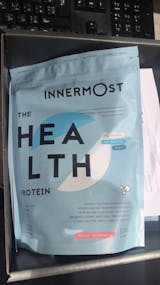Imagine a gadget that gives you real-time insights into how your body reacts to every meal, promising to boost your athletic performance and improve your eating habits. Sounds amazing, right? But is there enough scientific research to back these claims?
I recently sat down with one of Innermost's resident nutritionists, Isabelle Spellissy, to cut through the hype and see what CGMs are really all about and what they’ve actually been proven to achieve.
"What Are CGMs?"
Continuous Glucose Monitors track your blood sugar levels around the clock. They use a small sensor typically attached to your arm, and allow you to check your glucose levels on your phone. This tech provides info on how your glucose levels fluctuate based on what you eat, your exercise routines, stress, and sleep patterns.
For diabetics, CGMs are a game-changer, helping them maintain their glucose levels within a target range and improving their health outcomes. But now, manufacturers are marketing CGMs to everyone, not just diabetics, with promises of optimising blood sugar for peak physical and mental performance. This trend, pushed by personalised nutrition companies, has sparked a surge in interest from non-diabetics who are eager to try them out.
"The Promises of CGMs"
For those without diabetes, CGMs are touted with several shiny benefits, all aimed at boosting health, wellness, and performance:
-
Metabolic Health Monitoring: Get a grip on how food, exercise, and lifestyle choices impact your glucose levels.
- Nutritional Guidance: See how different foods affect you, helping you choose meals that keep your blood sugar stable.
- Stress and Sleep Insights: Understand how stress and sleep affect your glucose levels, helping you manage both better.
- Early Detection of Insulin Sensitivity Issues: Spot early signs of insulin resistance or prediabetes, giving you a chance to make changes before it’s too late.
"The Reality Check"
While CGMs sound amazing, there are some serious caveats:
- Cost: These devices aren’t cheap, and if you’re not diabetic, insurance probably won’t cover them.
- Lack of Clinical Guidelines: No clear or established guidelines exist for non-diabetics using CGMs, which can lead to confusion and misinterpretation.
- Psychological Impact: Constant monitoring can make you anxious and might lead to obsessive behaviors and excessive self-monitoring.
- Overemphasis on Glucose Levels: Fixating on glucose can distract from other important health factors like overall nutrition, fitness, and mental well-being.
- Potential for Misuse: Misreading the data can lead to unhealthy eating habits or extreme diets based on short-term glucose responses.
- Limited Proven Benefits: The clinical benefits of CGMs are still being studied, with research currently indicating that there isn’t enough evidence to support significant health benefits.
"What Can You Do?"
Instead of parting with your hard earned cash and jumping on the CGM bandwagon, here are some proven alternative strategies to boost your health:- Dietary Modifications: Eat whole, nutrient-rich foods. Balance your meals with carbs, proteins, and fats to maintain steady energy levels.
- Meal Routine and Portion Control: Stick to a meal schedule and watch your portion sizes to avoid energy crashes.
- Keep Tracking: Use a food journal or app to track what you eat and how it affects you. This can help to make informed choices about your food intake and adjust as needed.
- Regular Exercise: Mix in cardio, strength training, and flexibility exercises to improve your fitness and mood.
- Gut Health: Eat fiber-rich and fermented foods to support your gut. Consider prebiotics and probiotics for an extra boost. Feel free to check out The Digest Capsules.
- Hydration: Drink plenty of water. Proper hydration is essential for overall health, energy levels, cognitive function, and athletic performance. We’ve got something coming soon that could help with that. Watch this space.
By focusing on these holistic lifestyle changes, you can enhance your diet, performance, gut health, mood, and stress levels without needing a CGM.
To wrap it up, the buzz around CGMs for non-diabetics is growing, and we might see more benefits and guidelines with further research. But for now, if you’re living a healthy lifestyle, you probably don’t need one of these gadgets.
Some people are excited about their potential, but it’s best to approach CGMs cautiously and consult healthcare professionals to make sure you’re using them safely and effectively.
Stay smart and keep it simple.
References:
-
Beck, R. W., Riddlesworth, T., Ruedy, K., Ahmann, A., Haller, S., Kruger, D. F., ... & Bergenstal, R. M. (2017). Continuous glucose monitoring versus usual care in patients with type 2 diabetes receiving multiple daily insulin injections: a randomized trial. Annals of Internal Medicine, 167(6), 365-374.
-
Basu, A., Dube, S., & Basu, R. (2019). Continuous glucose monitoring: a powerful tool for the non-diabetic population. Expert Review of Medical Devices, 16(11), 903-913.
-
Pettus, J. H., Edelman, S. V., & Price, D. A. (2020). How Patients with Type 1 Diabetes Use Continuous Glucose Monitoring Data and Make Insulin Dosing Decisions. Endocrine Practice, 26(6), 625-630.
























